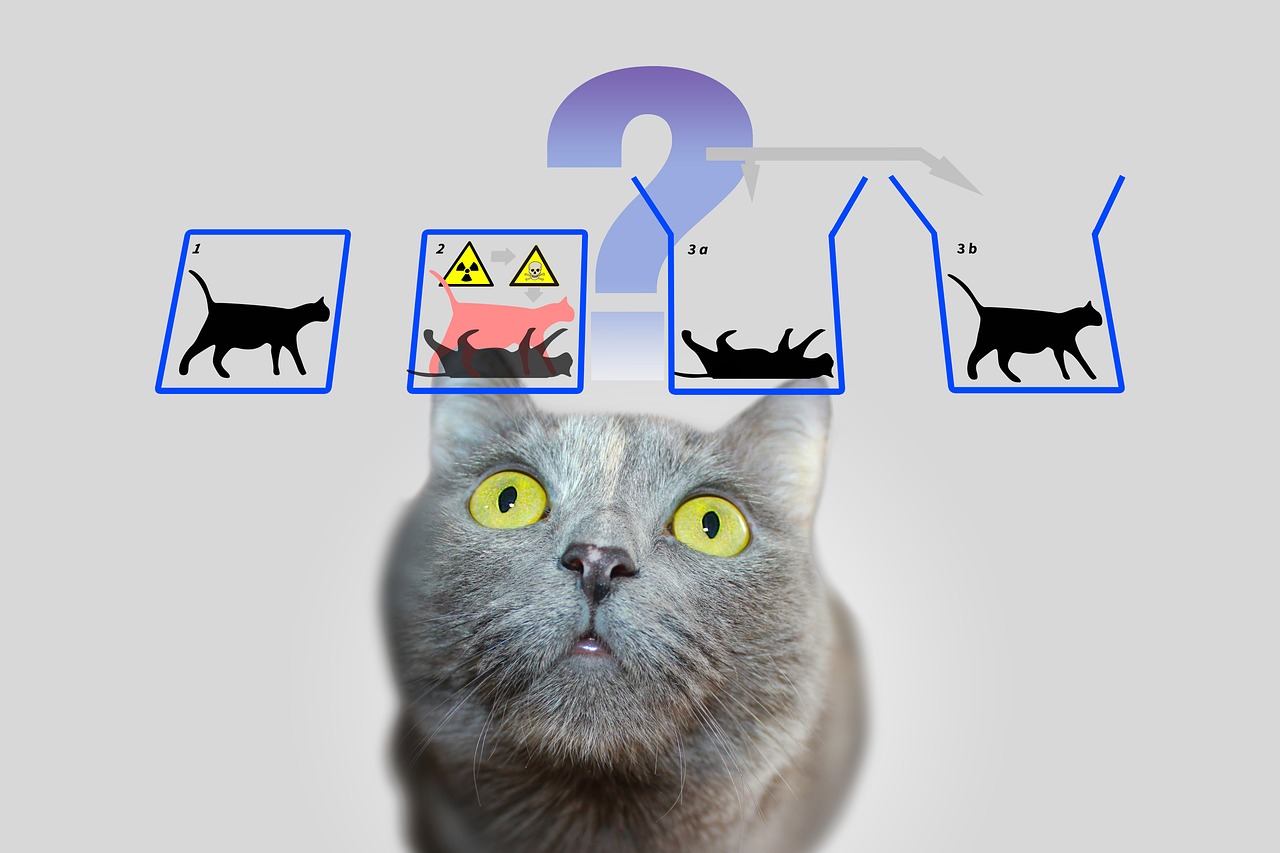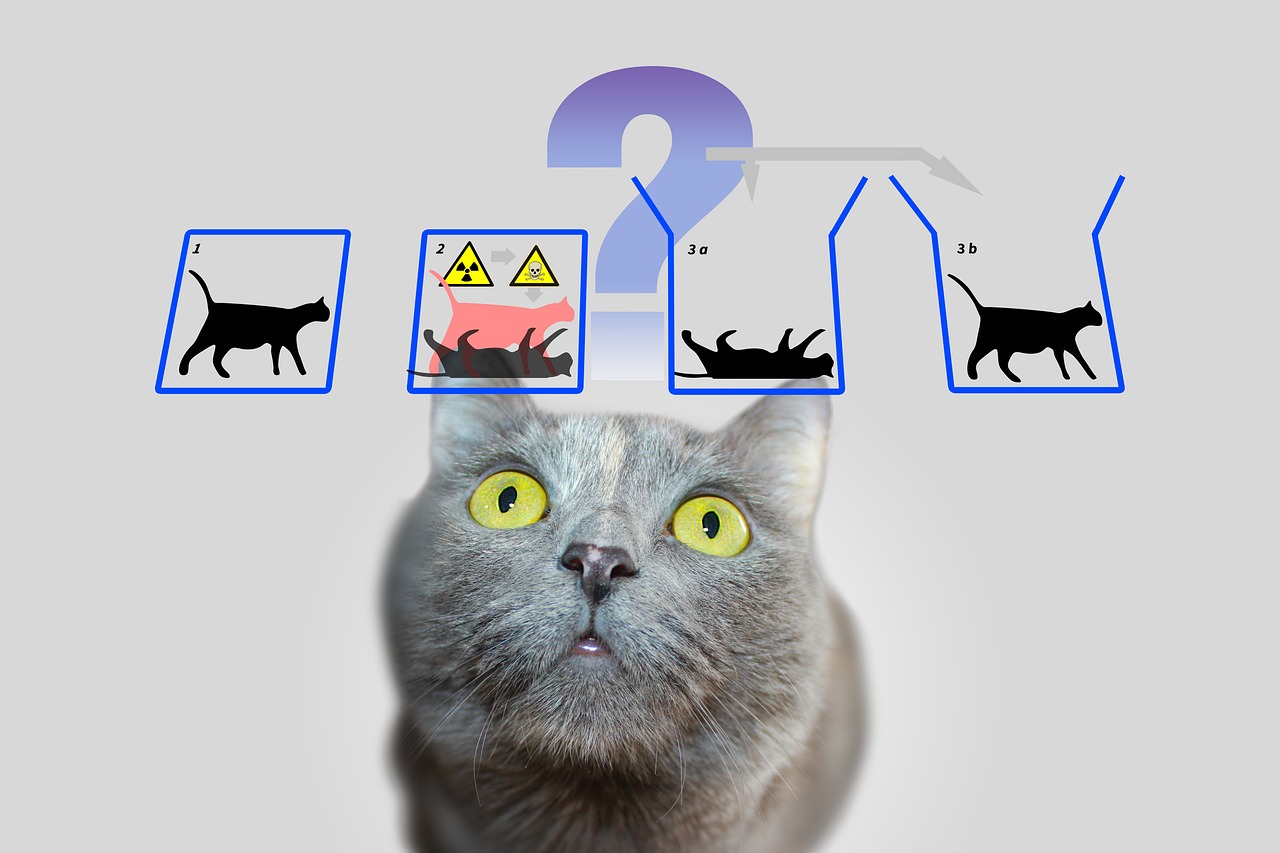Quantum Encryption - Securing Military Satellites
In an era where information is power, the security of military satellite communications has become paramount. The stakes are incredibly high, as these satellites serve as the backbone of national defense, enabling real-time communication, reconnaissance, and strategic operations. With the increasing sophistication of cyber threats, traditional encryption methods are proving to be inadequate. This is where quantum encryption steps in, offering a revolutionary approach to safeguarding sensitive military data. Imagine a world where every piece of information transmitted is virtually impenetrable; that’s the promise of quantum encryption.
Quantum encryption operates on the principles of quantum mechanics, which govern the behavior of particles at the atomic and subatomic levels. Unlike classical encryption methods that rely on mathematical algorithms and can be broken with enough computational power, quantum encryption offers a fundamentally different approach. By utilizing the unique properties of quantum bits, or qubits, quantum encryption ensures that any attempt to intercept or eavesdrop on communication is immediately detectable. This is akin to having a security system that not only locks your doors but also alerts you the moment someone tries to pick the lock.
The implications of quantum encryption for military satellites are profound. With the ability to create secure communication channels that are resistant to hacking, military operations can be conducted with a greater degree of confidence. The technology promises to enhance the integrity of critical missions by ensuring that sensitive information remains confidential and secure from potential adversaries. As we delve deeper into the mechanics of quantum encryption, it becomes evident that this is not just a technological upgrade; it represents a paradigm shift in how we think about security in the digital age.
As we explore the potential of quantum encryption, we must also consider the challenges that lie ahead. Implementing such advanced technology requires significant investment and infrastructure. However, the benefits far outweigh the costs when it comes to protecting national security. In the following sections, we will uncover the principles of quantum mechanics that underpin this technology, its advantages, the challenges of implementation, and what the future holds for quantum encryption in military applications.
Military satellites are critical for national defense, providing essential communication and reconnaissance capabilities. Understanding the importance of securing these assets is vital to safeguarding sensitive information and maintaining operational integrity.
Quantum encryption leverages the principles of quantum mechanics to protect data transmission. This section outlines how it differs from traditional encryption methods and the unique advantages it offers in securing satellite communications.
Quantum encryption relies on fundamental principles such as superposition and entanglement. This subsection explains these concepts and how they form the basis for secure communication channels in military applications.
Superposition allows quantum bits (qubits) to exist in multiple states simultaneously. This property enhances security by making it nearly impossible for eavesdroppers to intercept information without detection.
Entanglement creates a link between qubits, such that the state of one instantly affects the other. This phenomenon is crucial for ensuring secure key distribution in military satellite communications.
The implementation of quantum encryption offers several advantages, including unparalleled security, resistance to hacking, and the ability to detect eavesdropping attempts in real-time, making it ideal for military applications.
Despite its potential, quantum encryption faces challenges such as technological limitations, high costs, and the need for specialized infrastructure. Addressing these issues is essential for widespread adoption in military satellite systems.
Current quantum technology is still in its infancy, and scalability remains a significant hurdle. This section discusses the limitations that need to be overcome for effective implementation in military contexts.
The financial investment required for quantum encryption systems can be substantial. This subsection examines the cost-benefit analysis of implementing such systems in military operations compared to traditional methods.
As technology advances, quantum encryption is poised to revolutionize military communication. This section speculates on future developments and the potential for enhanced security measures in satellite operations.
- What is quantum encryption? Quantum encryption is a method of securing data transmission using the principles of quantum mechanics, making it highly resistant to eavesdropping.
- How does quantum encryption differ from traditional encryption? Unlike traditional encryption, which can be broken with enough computational power, quantum encryption uses qubits that allow for detection of any interception attempts.
- What are the main challenges in implementing quantum encryption? The main challenges include technological limitations, high costs, and the need for specialized infrastructure.
- What are the future prospects for quantum encryption in military applications? As technology advances, quantum encryption is expected to enhance security measures in military satellite communications significantly.

The Importance of Satellite Security
Military satellites are not just shiny objects orbiting the Earth; they are the backbone of national defense, providing critical communication, reconnaissance, and intelligence capabilities. Imagine a world where these satellites are compromised—where sensitive information could fall into the wrong hands. The ramifications would be catastrophic, affecting everything from military operations to national security. Therefore, understanding the importance of securing these assets is vital to safeguarding sensitive information and maintaining operational integrity.
In the digital age, where cyber threats are evolving at an alarming rate, the security of satellite communications has never been more crucial. With increasing reliance on satellite technology for military operations, ensuring the integrity and confidentiality of the data transmitted through these channels is essential. A breach could lead to the loss of operational capabilities, revealing strategic plans to adversaries and jeopardizing missions. This is why robust security measures are not just optional; they are a necessity.
Moreover, the potential for hostile nations or rogue actors to exploit vulnerabilities in satellite systems adds another layer of urgency. As we witness a surge in satellite launches globally, the competition for space dominance intensifies. Military satellites must be equipped with advanced security protocols to counteract these threats. The stakes are high, and the consequences of inaction could be dire.
To illustrate the significance of satellite security, consider the following key points:
- Operational Integrity: Secure satellite communications ensure that military operations can proceed without interference or the risk of data breaches.
- Confidentiality of Sensitive Information: Protecting classified data transmitted via satellites is crucial for national security.
- Deterrence Against Adversaries: A robust security framework can deter potential threats and signal strength to adversaries.
In conclusion, the importance of satellite security cannot be overstated. As military operations become increasingly reliant on satellite technology, the need for enhanced security measures, like quantum encryption, becomes more apparent. It is not just about protecting data; it is about safeguarding the very fabric of national defense.
- Why is satellite security important for military operations?
Satellite security is crucial for ensuring that military communications are protected from interception and disruption, which is vital for operational success. - What are the main threats to satellite security?
The main threats include cyber attacks, jamming, and physical attacks on satellite infrastructure. - How does quantum encryption enhance satellite security?
Quantum encryption uses the principles of quantum mechanics to create secure communication channels that are nearly impossible to intercept without detection.

Overview of Quantum Encryption
Quantum encryption is not just a buzzword; it represents a seismic shift in how we think about securing data transmission, especially in the context of military satellite communications. Unlike traditional encryption methods that rely on mathematical algorithms, quantum encryption leverages the bizarre yet fascinating principles of quantum mechanics. This means that instead of merely scrambling data, quantum encryption fundamentally alters how we transmit and secure that data, making it nearly impossible for unauthorized parties to intercept without detection.
At its core, quantum encryption utilizes quantum bits or qubits, which can exist in multiple states at once due to a property called superposition. This capability allows for a level of complexity and security that traditional bits—those pesky 0s and 1s—simply can't match. Imagine trying to eavesdrop on a conversation where the words are constantly changing; that’s essentially what quantum encryption does to data. It keeps potential intruders guessing and unable to make sense of intercepted information.
Furthermore, quantum encryption employs another intriguing principle known as entanglement. When qubits become entangled, the state of one qubit is directly tied to the state of another, no matter the distance separating them. This means that if someone attempts to interfere with the communication, the disturbance will be immediately noticeable, alerting the parties involved that their secure channel has been compromised. This level of security is particularly crucial for military applications where the stakes are incredibly high, and the information being transmitted can mean the difference between victory and defeat.
In summary, quantum encryption is not merely an upgrade to existing encryption methods; it is a revolutionary approach that offers unparalleled security through the principles of quantum mechanics. As military organizations around the globe begin to recognize its potential, the landscape of secure communications is set to change dramatically, ensuring that sensitive information remains protected against increasingly sophisticated threats.
- What is quantum encryption? Quantum encryption is a method of securing data transmission using the principles of quantum mechanics, making it nearly impossible for eavesdroppers to intercept information without detection.
- How does quantum encryption differ from traditional encryption? Traditional encryption relies on mathematical algorithms to secure data, while quantum encryption uses quantum bits (qubits) that can exist in multiple states, enhancing security.
- What are the benefits of using quantum encryption in military communications? Some benefits include unparalleled security, real-time detection of eavesdropping attempts, and the ability to create secure communication channels that are resistant to hacking.
- Are there challenges in implementing quantum encryption? Yes, challenges include technological limitations, high costs, and the need for specialized infrastructure.

Principles of Quantum Mechanics
At the heart of quantum encryption lies the fascinating world of quantum mechanics, a field that defies our conventional understanding of physics. Unlike classical physics, which operates on a predictable and linear basis, quantum mechanics introduces us to a realm where particles can exist in multiple states simultaneously and where the very act of observation can alter outcomes. This is where the magic of quantum encryption begins, creating a robust framework for secure communication, particularly in military applications.
One of the foundational concepts in quantum mechanics that plays a pivotal role in encryption is superposition. Imagine flipping a coin; it’s either heads or tails, right? Now, think about a quantum coin that can be both heads and tails at the same time until you decide to look at it. This unique property allows quantum bits (or qubits) to exist in multiple states, enhancing security in ways traditional bits cannot. When it comes to military communications, this means that even if an eavesdropper tries to intercept the data, the act of doing so would disturb the state of the qubits, alerting the sender and receiver to the breach. Thus, superposition acts as a powerful guardian of sensitive information.
Another fundamental principle is entanglement, which can be likened to a pair of dancers performing in perfect synchrony, no matter how far apart they are. When qubits become entangled, the state of one qubit instantly influences the state of another, regardless of the distance separating them. This instantaneous connection is not just a quirky phenomenon; it forms the backbone of secure key distribution in military satellite communications. By utilizing entangled qubits, military operations can ensure that any attempt to intercept or tamper with the key used for encryption will be immediately detectable, thus maintaining the integrity of the communication channel.
To sum it up, the principles of quantum mechanics—superposition and entanglement—are not just abstract concepts; they are the very essence of what makes quantum encryption a revolutionary force in securing military satellites. By leveraging these principles, military communications can achieve a level of security that traditional methods simply cannot match, ensuring that sensitive data remains confidential and protected against potential threats.
- What is quantum encryption? Quantum encryption is a method of securing data transmission using the principles of quantum mechanics, making it nearly impossible for unauthorized parties to intercept information without detection.
- How does superposition enhance security? Superposition allows qubits to exist in multiple states, meaning that any attempt to measure or intercept the data alters its state, alerting the sender and receiver to the breach.
- What role does entanglement play in military communications? Entanglement links qubits in such a way that the state of one qubit affects another, ensuring secure key distribution and making it easy to detect any interference.
- Are there challenges in implementing quantum encryption? Yes, challenges include technological limitations, high costs, and the need for specialized infrastructure to support quantum systems.

Superposition in Encryption
When we talk about superposition in the context of quantum encryption, we're diving into one of the most fascinating aspects of quantum mechanics. Imagine a coin spinning in the air; while it's in motion, it’s neither just heads nor tails, but a blend of both. This is similar to how quantum bits or qubits operate. Unlike traditional bits, which can only be in a state of 0 or 1, qubits can exist in a state of 0, 1, or both at the same time, thanks to superposition. This unique property makes quantum encryption exceptionally powerful.
In military satellite communications, this means that information can be transmitted in a way that is fundamentally different from conventional methods. For instance, when a qubit is in superposition, it creates a scenario where any attempt to observe or measure it will disturb its state. This disturbance acts as a red flag, alerting the sender and receiver that an eavesdropper might be attempting to intercept the communication. Thus, superposition not only enhances security but also provides a built-in alarm system for potential breaches.
To illustrate this concept further, consider the following key points about superposition in encryption:
- Enhanced Security: The ability of qubits to exist in multiple states simultaneously means that even if an attacker tries to intercept the data, they cannot do so without altering the information itself.
- Real-time Detection: The moment an eavesdropper attempts to measure the qubit’s state, the original state is disrupted, allowing for immediate detection of unauthorized access.
- Complexity of Interception: The mathematical complexity involved in predicting the state of superposed qubits makes it nearly impossible for hackers to decode the information without being detected.
In summary, superposition is not just a theoretical concept but a practical tool that enhances the security of military satellite communications. By utilizing the principles of superposition, military operations can ensure that their sensitive data remains protected against potential threats. As we move forward, the integration of superposition in quantum encryption will likely become a cornerstone of secure military communications.
- What is superposition in quantum encryption?
Superposition refers to the ability of quantum bits (qubits) to exist in multiple states at once, which enhances security by making it difficult for eavesdroppers to intercept information without detection.
- How does superposition improve security?
Any attempt to measure a qubit in superposition will disturb its state, alerting the sender and receiver of potential interception, thus providing real-time detection of eavesdropping.
- Can traditional encryption methods achieve similar security levels?
No, traditional encryption methods do not leverage the principles of quantum mechanics, making them less secure against sophisticated hacking attempts compared to quantum encryption.

Entanglement and Security
Entanglement is one of the most fascinating phenomena in quantum mechanics, and it plays a vital role in enhancing security for military satellite communications. Imagine two quantum bits, or qubits, that are intertwined in such a way that the state of one instantly influences the state of the other, no matter how far apart they are. This phenomenon is not just a mind-bending concept; it has real-world applications that can revolutionize how we secure sensitive military data.
In the context of military operations, the implications of entanglement are profound. When two qubits are entangled, any attempt by an eavesdropper to intercept the communication will disturb the state of the qubits. This disturbance serves as a red flag, alerting the parties involved that their communication has been compromised. In a world where information security is paramount, this ability to detect unauthorized access in real-time is a game-changer.
To illustrate how entanglement enhances security, consider the following points:
- Instantaneous Response: The immediate effect of measuring one qubit on its entangled partner means that any interference can be rapidly detected, enabling swift countermeasures.
- Unbreakable Keys: Entangled qubits can be used to generate cryptographic keys that are theoretically unbreakable, as any attempt to observe the keys will alter them, rendering them useless to the interceptor.
- Enhanced Communication Integrity: The inherent nature of entanglement ensures that the communication channel remains secure, reinforcing trust in military satellite operations.
However, while the benefits of entanglement in quantum encryption are clear, it's important to recognize that the technology is still evolving. Researchers are working tirelessly to overcome challenges such as maintaining entanglement over long distances and integrating this technology into existing military infrastructure. The potential for entanglement to provide unprecedented levels of security is immense, but it requires ongoing innovation and investment.
In summary, entanglement is not just a theoretical concept; it is a practical tool that can significantly enhance the security of military satellite communications. By leveraging this quantum phenomenon, military organizations can protect their sensitive data from potential breaches and ensure the integrity of their operations. As we continue to explore the possibilities of quantum encryption, entanglement will undoubtedly remain at the forefront of discussions about the future of secure communications.
- What is quantum entanglement? Quantum entanglement is a phenomenon where two or more particles become interconnected in such a way that the state of one particle instantly influences the state of another, regardless of the distance separating them.
- How does entanglement improve security? Entanglement enhances security by allowing parties to detect any unauthorized attempts to intercept their communication. Any disturbance caused by an eavesdropper will be immediately noticeable.
- Is quantum encryption completely secure? While quantum encryption offers unprecedented security features, it is still an evolving technology. Challenges such as maintaining entanglement over long distances must be addressed to maximize its potential.
- What are the practical applications of quantum entanglement? Beyond military applications, quantum entanglement has potential uses in secure financial transactions, data protection in healthcare, and safeguarding personal information in various sectors.

Advantages of Quantum Encryption
When it comes to safeguarding sensitive military communications, the are nothing short of revolutionary. Imagine a world where your data is not just encrypted but is practically unbreakable. Quantum encryption harnesses the power of the tiniest particles in the universe—quantum bits or qubits—to create a security framework that traditional encryption methods simply can't match. This isn't just an upgrade; it's like moving from a bicycle to a spaceship!
One of the most compelling benefits of quantum encryption is its unparalleled security. Traditional encryption relies on complex algorithms that, while effective, can still be vulnerable to advanced hacking techniques. In contrast, quantum encryption uses the laws of physics to secure data. For instance, if an eavesdropper attempts to intercept the quantum key being transmitted, the very act of observation alters the state of the qubits, alerting the sender and receiver to the breach. This immediate detection of eavesdropping is a game-changer, providing a level of security that is simply unattainable with classical methods.
Moreover, quantum encryption is remarkably resistant to hacking. As we delve deeper into the digital age, cyber threats are becoming increasingly sophisticated. However, quantum encryption's reliance on quantum mechanics means that even the most advanced hackers would find it nearly impossible to crack the code without being detected. This level of resilience is crucial for military applications, where the stakes are incredibly high and the consequences of a data breach could be catastrophic.
Additionally, the ability to detect eavesdropping attempts in real-time is another striking advantage. In military operations, timely information is vital. With quantum encryption, if someone tries to snoop on the communication, the sender and receiver will know instantly. This feature not only enhances security but also allows for immediate countermeasures—think of it as having a security alarm that alerts you the moment a breach occurs.
In summary, the advantages of quantum encryption can be encapsulated as follows:
- Unparalleled Security: Utilizes quantum mechanics for data protection.
- Resistance to Hacking: Highly resilient against cyber threats.
- Real-Time Eavesdropping Detection: Immediate alerts for unauthorized access.
These advantages make quantum encryption not just a technical innovation but a strategic necessity for military satellite communications. As we continue to explore the potential of this technology, it becomes increasingly clear that embracing quantum encryption could redefine how we think about data security in the military context.
- What is quantum encryption?
Quantum encryption is a method of securing data using the principles of quantum mechanics, making it highly resistant to eavesdropping and hacking. - How does quantum encryption differ from traditional encryption?
Unlike traditional encryption that relies on mathematical algorithms, quantum encryption uses the laws of physics, which provides a higher level of security. - Can quantum encryption be hacked?
While no system is entirely foolproof, quantum encryption is designed to be resistant to hacking attempts, and any interception attempts would be detected immediately. - What are the practical applications of quantum encryption?
Quantum encryption is particularly valuable in military communications, financial transactions, and any field where data security is paramount.

Challenges in Implementation
Despite the promising potential of quantum encryption, implementing this cutting-edge technology in military satellite communication is not without its hurdles. One of the most significant challenges is the technological limitations currently faced by quantum systems. The field of quantum mechanics is still relatively nascent, and many of the technologies required for effective quantum encryption are still in development. This means that scalability is a major concern; as military operations demand robust and reliable systems, the existing quantum technologies must evolve to meet these needs.
Furthermore, the cost considerations associated with deploying quantum encryption systems are substantial. The financial investment required to develop and maintain these systems can be daunting. When comparing the costs of traditional encryption methods to those of quantum solutions, military organizations must conduct a thorough cost-benefit analysis. This analysis should consider not only the initial investment but also the long-term savings and security benefits that quantum encryption can provide. In many cases, the potential for enhanced security may justify the higher upfront costs, but this is not always a straightforward decision.
Another challenge lies in the need for specialized infrastructure. Quantum encryption requires a different set of tools and technologies than what is currently in place for traditional communication systems. This means that military organizations may need to invest in new hardware, software, and training for personnel, all of which can complicate and delay the implementation process. The transition from existing systems to quantum-based solutions is not just a technical shift; it also involves a cultural change within the organization.
Moreover, the integration of quantum encryption into existing military frameworks presents logistical challenges. Military operations often rely on a complex network of systems that must work seamlessly together. Introducing a new technology like quantum encryption necessitates careful planning and coordination to ensure compatibility with legacy systems. This integration process can be time-consuming, requiring extensive testing and validation to confirm that all components function correctly together.
In summary, while the benefits of quantum encryption for securing military satellites are clear, the path to implementation is fraught with challenges. Addressing technological limitations, evaluating cost implications, developing specialized infrastructure, and ensuring seamless integration into existing systems are all critical steps that must be taken to realize the full potential of quantum encryption in military applications.
- What is quantum encryption? Quantum encryption is a method of securing data transmission using the principles of quantum mechanics, making it nearly impossible for unauthorized parties to intercept information without detection.
- Why is quantum encryption important for military satellites? It provides unparalleled security against hacking and eavesdropping, which is crucial for protecting sensitive military communications and operations.
- What are the main challenges in implementing quantum encryption? Key challenges include technological limitations, high costs, the need for specialized infrastructure, and integration with existing military systems.
- How does quantum encryption differ from traditional encryption? Unlike traditional methods that rely on mathematical algorithms, quantum encryption uses quantum bits (qubits) that can exist in multiple states, offering a higher level of security.

Technological Limitations
When we talk about quantum encryption, it’s hard not to get excited about its potential, especially in military applications. However, we must also face the hard truth: the technology is still in its infancy. One of the most pressing is scalability. Currently, creating a quantum communication network that can handle the vast amounts of data required by military operations is a significant challenge. It’s like trying to fit a square peg in a round hole; the existing infrastructure simply isn’t designed to support the unique demands of quantum technologies.
Moreover, the hardware requirements for quantum encryption systems are quite specialized. For instance, quantum key distribution (QKD) relies on sophisticated devices that can generate and detect qubits with extreme precision. This is not just a matter of upgrading existing systems; it requires entirely new setups that can be prohibitively expensive. Picture trying to build a state-of-the-art military base in a remote area where the costs of transportation and installation skyrocket. Similarly, the costs associated with quantum technology can be a barrier to entry for many military organizations.
Another limitation is the environmental sensitivity of quantum systems. Quantum states can be easily disturbed by external factors such as temperature fluctuations and electromagnetic interference. This sensitivity poses a significant risk in military operations, where conditions can be unpredictable. Imagine trying to maintain a delicate balance on a tightrope while the wind howls around you; that’s what it’s like for quantum systems in less-than-ideal environments. To mitigate these risks, robust protection measures need to be developed, further complicating the implementation process.
In addition, the distance limitations of quantum communication are another hurdle. Quantum signals can only travel a limited distance before they become too weak to be detected. While researchers are exploring ways to extend this range, such as using quantum repeaters, these solutions are still largely theoretical. It’s akin to trying to send a message across a vast ocean with a tiny boat; without the right tools, the message may never reach its destination.
To summarize, while quantum encryption holds immense promise for securing military satellite communications, several technological limitations must be addressed. The challenges of scalability, hardware requirements, environmental sensitivity, and distance limitations create a complex landscape that military organizations must navigate. As we continue to push the boundaries of what’s possible, overcoming these obstacles will be crucial for the successful implementation of quantum encryption in military operations.
- What is quantum encryption?
Quantum encryption is a method of securing data transmission using the principles of quantum mechanics, which offers enhanced security compared to traditional encryption methods. - Why is quantum encryption important for military applications?
It provides unparalleled security, making it difficult for adversaries to intercept communications without detection, which is crucial for national defense. - What are the main challenges of implementing quantum encryption?
Challenges include technological limitations, high costs, environmental sensitivity, and distance limitations of quantum signals. - How does quantum encryption differ from traditional encryption?
Unlike traditional encryption, which relies on mathematical algorithms, quantum encryption uses the principles of quantum mechanics, making it theoretically more secure against hacking.

Cost Considerations
When diving into the world of quantum encryption for military satellites, one cannot overlook the elephant in the room: the cost. Implementing this cutting-edge technology is not just a matter of flipping a switch; it involves significant financial commitments that can make even the most seasoned budget planners raise an eyebrow. The initial setup costs for quantum encryption systems can be substantial, often running into millions of dollars. This includes the expenses related to specialized hardware, software, and the necessary infrastructure to support such advanced systems.
Moreover, the ongoing maintenance and operational costs add another layer of financial complexity. Unlike traditional encryption methods that might require periodic updates, quantum systems demand continuous monitoring and adjustments to ensure they remain secure against evolving threats. This need for constant vigilance can strain military budgets, especially when resources are already allocated to various defense projects.
To better illustrate the financial implications, consider the following table that outlines some key cost factors associated with quantum encryption:
| Cost Factor | Estimated Cost | Notes |
|---|---|---|
| Initial Setup | $1M - $10M | Varies based on scale and technology |
| Infrastructure | $500K - $5M | Includes facilities and equipment |
| Maintenance | $100K - $1M/year | Ongoing costs for updates and monitoring |
While the financial burden may seem daunting, it's essential to weigh these costs against the potential benefits of enhanced security. For military operations, the stakes are incredibly high. A successful breach could lead to the loss of sensitive information, compromising national security and potentially putting lives at risk. Thus, when considering the cost of quantum encryption, one must also factor in the cost of failure—something that could be far more devastating than the initial investment.
In conclusion, while the transition to quantum encryption in military satellite systems presents significant financial challenges, the potential for unparalleled security and the protection of vital information may justify the expense. As technology continues to evolve and costs decrease over time, we may find that investing in quantum encryption becomes not just a necessity, but a standard practice in safeguarding military communications.
- What is quantum encryption? Quantum encryption is a method of securing data transmission using the principles of quantum mechanics, making it nearly impossible for unauthorized parties to intercept the information without detection.
- Why is quantum encryption important for military satellites? Military satellites require the highest level of security to protect sensitive information and ensure operational integrity, which quantum encryption can provide.
- What are the main challenges of implementing quantum encryption? The primary challenges include high costs, technological limitations, and the need for specialized infrastructure.
- How does quantum encryption differ from traditional encryption? Unlike traditional encryption, which relies on complex algorithms, quantum encryption uses quantum bits (qubits) and principles like superposition and entanglement to secure data.

Future of Quantum Encryption in Military Applications
The future of quantum encryption in military applications is not just a fleeting trend; it represents a paradigm shift in how we think about security. As technology continues to advance at a breathtaking pace, the potential for quantum encryption to redefine military communications is becoming increasingly evident. Imagine a world where military satellites are equipped with quantum encryption systems that are virtually unhackable. This is not science fiction; it is rapidly becoming a reality.
One of the most exciting prospects for quantum encryption is its ability to enhance operational security significantly. With the rise of cyber threats and the increasing sophistication of adversaries, traditional encryption methods are simply not enough. Quantum encryption offers a level of security that is fundamentally different from anything we have seen before. It can provide military personnel with the assurance that their communications are secure, even in the face of advanced hacking attempts.
Furthermore, as quantum technologies mature, we can expect to see a broader integration of these systems into existing military infrastructure. This means that not only will new satellites be equipped with quantum encryption, but existing systems will also undergo upgrades. The transition may involve a combination of hardware enhancements and software updates, ensuring that military communications remain at the cutting edge of security.
However, the journey towards widespread adoption of quantum encryption will not be without its hurdles. The military will need to invest in training and education for personnel who will operate these advanced systems. Understanding the principles of quantum mechanics, even at a basic level, will be crucial for effective implementation. Moreover, collaboration between military branches and private sector quantum technology companies will be essential to drive innovation and overcome the existing technological limitations.
As we look ahead, the potential applications of quantum encryption in military settings are vast. For instance, secure communications for drone operations, real-time battlefield data sharing, and encrypted satellite imagery could all benefit from quantum encryption. The ability to detect eavesdropping attempts in real-time will provide an additional layer of security, allowing military leaders to respond swiftly to any threats.
In conclusion, the future of quantum encryption in military applications is bright and filled with possibilities. As we continue to explore the boundaries of quantum technology, we can expect to see significant advancements that will not only enhance security but also revolutionize how military operations are conducted. The question is not whether quantum encryption will become a standard practice in military communications, but rather how quickly we can overcome the challenges and embrace this transformative technology.
- What is quantum encryption? Quantum encryption is a method of securing data transmission using the principles of quantum mechanics, making it highly resistant to interception and hacking.
- How does quantum encryption differ from traditional encryption? Unlike traditional encryption, which relies on mathematical algorithms, quantum encryption uses quantum bits (qubits) that can exist in multiple states simultaneously, providing enhanced security.
- What are the main challenges of implementing quantum encryption? The main challenges include technological limitations, high costs, and the need for specialized infrastructure and training.
- What future applications can we expect from quantum encryption in the military? Future applications may include secure communications for drone operations, real-time battlefield data sharing, and encrypted satellite imagery.
Frequently Asked Questions
- What is quantum encryption?
Quantum encryption is a cutting-edge technology that uses the principles of quantum mechanics to secure data transmission. Unlike traditional encryption methods, which can be vulnerable to hacking, quantum encryption offers a level of security that is almost impossible to breach, making it particularly valuable for military applications.
- How does quantum encryption enhance satellite communication security?
Quantum encryption enhances satellite communication security by utilizing unique properties like superposition and entanglement. These principles ensure that any attempt to intercept the communication can be detected, thereby protecting sensitive information from potential threats.
- What are the main advantages of using quantum encryption in military operations?
The main advantages of quantum encryption in military operations include unparalleled security against hacking, real-time detection of eavesdropping attempts, and the ability to securely distribute encryption keys. This makes it an ideal solution for safeguarding critical military communications.
- What challenges does quantum encryption face in implementation?
Quantum encryption faces several challenges, including technological limitations, high costs, and the need for specialized infrastructure. These hurdles must be addressed to ensure its widespread adoption in military satellite systems.
- Is quantum encryption cost-effective for military use?
While quantum encryption can be costly to implement, its long-term benefits in terms of security and data protection may outweigh the initial investment. A careful cost-benefit analysis is essential to determine its feasibility for specific military operations.
- What does the future hold for quantum encryption in military applications?
The future of quantum encryption in military applications looks promising. As technology continues to advance, we can expect further developments that will enhance security measures in satellite operations, making military communications even more secure and reliable.



















